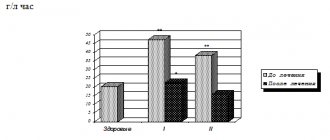What is menopause
Menopause or menopause is a period of gradual decline in the reproductive function of the female body. The average age of its onset is 45–50 years.
- 45–47 years is the normal age for the onset of menopause
- Under 40 years old - early menopause
- After 55 - late menopause
This process begins with a change in the menstrual cycle - periods become irregular, discharge becomes more scanty every month. The functional activity of the ovaries decreases: they produce less and less hormones that affect the woman’s body, and conceiving a child becomes almost impossible.
The menopausal period is accompanied by not the most pleasant symptoms, but, fortunately, today, with the help of specially selected therapy, it is possible to reduce their manifestations or even get rid of them completely.
Hot flashes during menopause: treatment without hormones
Expert opinion
Many women cannot take hormonal medications due to certain health conditions. For example, if there is a risk of breast cancer, a tendency to form venous blood clots, cerebrovascular accident (stroke) and heart attack, hormone replacement therapy is not recommended, since the potential risks from it may be higher than the benefits.
Obstetrician-gynecologist of the highest category Oksana Anatolyevna Gartleb
To mitigate the intensity of menopause symptoms, not only hormone replacement therapy, but also other drugs are used. Instead of hormones, you can use the following:
Drugs that normalize blood pressure
During menopause, changes in the water-salt balance occur, resulting in fluid retention in the body and an increase in blood volume. This leads to increased blood pressure during hot flashes. Taking medications that lower blood pressure helps reduce sweating and the feeling of heat during such conditions.
Sedatives and antidepressants
These medications, given in small doses, help reduce the stress caused by hot flashes. In addition, taking antidepressants and sedatives in some cases reduces the frequency and intensity of hot flashes by normalizing the condition of blood vessels.
Expert opinion
Remember that antidepressants can be quite harsh on your health and may cause some side effects. Therefore, their prescription and selection of the appropriate dosage should be handled exclusively by a specialized specialist.
Obstetrician-gynecologist of the highest category Oksana Anatolyevna Gartleb
Vitamin and mineral complexes, dietary supplements
During menopause, it is recommended to take complexes rich in retinol, tocopherol, ascorbic acid, B vitamins, vitamin D, calcium, magnesium, boron.
Dietary supplements based on phytoestrogens. Phytohormones include coconut oil, chamomile, calendula, ginseng root, grapes, dates, pomegranates, red clover, alfalfa, flax, licorice, etc.
Symptoms of menopause
You need to understand that menopause does not occur suddenly and unexpectedly in one day. This is not a sudden change in the state of the body, but a gradual one. The menopausal period can last up to 12 years, which is the norm. Changes will occur gradually, symptoms may come and go, and this is not a reason to worry.
The main symptoms that most women experience include:
- Tides. Increased heart rate with a sharp sensation of heat in the neck, chest and face. Accompanied by severe sweating and redness of the skin. Often occur at night.
- Itching and dryness of the vagina. They arise due to a natural decrease in the activity of the ovaries.
- Difficulty sleeping. Women during menopause experience insomnia and changes in sleep duration.
- Increased fatigue, absent-mindedness and apathy.
- Mood swings, tearfulness, depression. Such changes occur due to hormonal changes in the body, and it is important not to endure unpleasant symptoms, but to consult a doctor for corrective therapy.
- Decreased libido.
- Weight fluctuations, usually upward.
- Increased hair growth on the body, and in some cases on the face. This problem may require hormonal treatment.
- Development of atherosclerosis and increased blood pressure.
- Development of osteoporosis. Requires mandatory consultation with a doctor and prescription of calcium supplements!
- Problems with urination.
Some symptoms appear first, such as hot flashes, fatigue and depression. Some - only a couple of years after the onset of menopause - are increased hair growth, weight gain, sleep problems, dryness and itching. Late manifestations include atherosclerosis, osteoporosis, headaches, development of hypertension and diabetes.
How to reduce hot flashes and how to deal with excessive sweating?
To reduce the negative consequences of hormonal disorders during menopause, you need to take appropriate medications, adjust your diet, and adjust your work and rest schedule. However, that's not all. There are some simple rules to reduce the unpleasant symptoms of attacks:
- Avoid going to the bathhouse and sauna. Hot air in steam rooms causes excessive sweating.
- Spend less time outside on hot days, and also stay as far as possible from heat sources - fireplaces, stoves, heaters, bonfires.
- Stop smoking, eating hot, fatty and spicy foods, coffee, alcohol and sweets.
- A woman's diet during menopause should include more fresh fruits and vegetables, dairy products, cereals, wheat bran, chicken eggs, and nuts.
These products have a beneficial effect on female hormonal levels, which helps reduce the symptoms of menopause. It is also worth including foods rich in so-called phytohormones in your diet. In their composition they are close to human hormones, but are not as effective. Eat: coconut, soybean and olive oil, lentils, flax seeds, garlic, chickpeas, beans, barley, rye. - Drink at least 1.5 liters of water per day. Due to increased sweating during menopause, the body quickly loses fluid, so it must be replenished in a timely manner.
- Do not wear synthetic clothing. It is better to give preference to cotton, silk and linen items. The exception is fleece clothing: this artificial material dries quickly and provides the necessary moisture removal.
- Avoid outfits with high collars. Choose clothes with a neckline and cutouts near the neck.
- Change synthetic bedding to natural ones. This will help you sweat less while you sleep.
- If you experience intense hot flashes, you can carry a spare set of clothes with you. If you get very sweaty, you will have the opportunity to change clothes.
- Observe personal hygiene rules. To avoid the unpleasant odor of sweat, it is recommended to use a high-quality antiperspirant that prevents the appearance of unpleasant odor.
- Make time for rest, try to be less nervous and engage in static sports - Pilates, yoga, stretching, callanetics. During this difficult period, regular seaside holidays are highly desirable for the female body, but it is important to avoid hot months (July, August) and choose more comfortable and cooler ones - May, June and September.
Treatment of hot flashes during menopause
The main problems for women during menopause
One of the most striking problems of this period is the violation of intimate life. A woman’s desire naturally decreases, discomfort appears during sex, and the amount of natural lubrication decreases. But this is not a reason to give up intimate life altogether!
It is important to discuss the problem with your doctor and select special products - lubricants (for example, with a warming effect) that will relieve discomfort. It is also necessary to replenish the balance of hormones, which we will discuss later in the article.
In some cases, uterine bleeding that is not menstrual is possible. In this case, it is necessary to consult a gynecologist as soon as possible to avoid the development of pathologies.
Also, during menopause in women, calcium is actively washed out of the bones, which causes the development of osteoporosis - fragility of bone tissue. Modern diagnostics make it possible to detect the development of osteoporosis in a timely manner. And prevention will be stable moderate physical activity, a nutritious and varied diet.
Causes
Water retention and gas retention can be the cause of menopausal bloating.
Menopausal bloating usually has one of two main causes: water retention or gas retention. Both can cause bloating during menopause.
A woman's hormone levels often fluctuate during perimenopause, which is the time leading up to menopause when a woman's hormone levels decline. Elevated estrogen levels can cause water retention, which in turn can cause bloating.
Unfortunately, estrogen is not the only cause of menopause bloat. During and after menopause, bloating can also be associated with changes in the gastrointestinal tract. These changes can be caused by many things, including:
- changes in diet or appetite
- slow digestion
- stress associated with menopause
- swallowing air
- other health conditions
Any of the above can lead to bloating due to excess gas.
Ancient recipes for hot flashes
In the old days, women used, in addition to herbs, the following measures to get rid of illness:
- For menopausal hot flashes to the head, you should immediately raise both arms up or lower your legs into very hot water. The blood will immediately subside and you will feel better.
- For hot flashes, enemas with salt (1-2 teaspoons of salt in 100 ml of warm water) or vinegar (2 tablespoons of apple cider vinegar in 2 liters of water) help.
- Walking barefoot in water for 15 minutes brings relief. After which, without wiping your feet, you should put on your shoes and walk around until your feet are dry.
Metabolic syndrome
Menopause is an individual process for each woman. For some, menopause occurs, as we have already said, by the age of 50. For others, it begins before age 45 (early menopause) . And some representatives of the fair sex experience age-related changes even after 51 years of age (late menopause) .
External changes during menopause also individual . Some ladies, who can be called lucky, remain fresh and youthful for many years after its onset. The rest, unfortunately, are less fortunate. After menopause , wrinkles appear clearly, the skin becomes flabby and dry, changes affect the structure of the hair (it becomes dull and brittle). The object of female pride and sexual attractiveness – the breasts – also suffers. It becomes less elastic, the nipples lose their expression (men would say eroticism). Well, we have already spoken above about the loss of calcium from the bones and the resulting tendency to osteoporosis.
All these unfavorable changes indicate metabolic syndrome , characteristic of menopause. But, unfortunately, he is not limited to them only. A significant portion of the fair sex are subject to weight fluctuations . And in the direction of its increase. According to WHO statistics, two-thirds of women worldwide experience weight gain during menopause. For many, the jump is quite significant, up to 10-15 kg over three to four years. Although usually weight gain to the mentioned marks occurs slowly, on average 1-1.2 kg per year.
Another difficulty is that as women age, it becomes increasingly difficult to monitor their weight. After 55-60 years, weight loss becomes a completely problematic task. Again, “thanks” to the changed hormonal levels. In lovely ladies, the metabolic rate decreases and, on the contrary, the appetite increases. Certain psychological aspects also contribute to fat deposition. During menopause, women are sometimes prone to melancholy and depression; many believe that “old age has come,” “life is already over,” and so on in the same spirit. Therefore, they prefer to eat up such “grief”. As a result, the weight begins to grow even more rapidly. With all the ensuing consequences in the form of diabetes, high cholesterol, hypertension, breast cancer.
What is not customary to talk about
Urinary incontinence during menopause. After five years of no menstruation, every woman experiences urinary incontinence. She coughed, sneezed, laughed - and everything starts to leak. This happens because the mucous membrane of the urethra, like the vaginal mucosa, becomes thin and dry. And it must be supported - with candles or ointments. So that it is softer and not atrophic. Make an appointment with a urologist.
Sex during menopause. The same applies to decreased sexual activity. Due to a lack of hormones, the vagina ceases to produce secretions, dryness appears, which is why sexual life becomes a real torture.
Which foods reduce hot flashes and which increase them?
It is important to eat right during menopause. The menu should contain more plant foods: greens, vegetables; legumes; fruits, nuts. This food helps reduce the number of hot flashes. It is advisable to reduce protein foods, giving preference to fish as a source of Omega-3.
It is recommended to use flaxseed oil instead of animal fats. It helps reduce the frequency of hot flashes due to the phytoestrogens it contains. It is also useful to add flax seeds and sesame seeds to your food. Soy is rich in isoflavones, so it is advisable to introduce soy products such as tofu cheese, soybean oil, and soy milk into the diet.
Products containing phytoestrogens for women's health
Experts advise replenishing the lack of succinic acid in the female body by consuming lactic acid products, rye bread, and low-fat cheese. This allows you to maintain youth and overcome weakness and fatigue.
There are foods that trigger hot flashes. These are the following products:
- Containing caffeine (coffee, tea).
- Spicy.
- Fatty.
- Smoked.
- Sweets.
- Alcohol.
It is important to maintain a drinking regime during menopause. Experts recommend drinking 1.5 - 2 liters of clean water per day.
Help yourself
You can help alleviate the condition of menopause (menopause) without resorting to the help of doctors. However, help only for a while in order to make an appointment with a gynecologist. What to do?
Try to sleep at night . This means stop drinking coffee and strong black tea. A small cup is only allowed if you have low blood pressure.
Take a contrast shower before bed. It has a beneficial effect on both blood vessels and the nervous system. You should start with warm water and end with the same. If you are not yet ready to plunge completely, do contrasting hand baths.
Drink calming herbs. This will help your mood and normalize your sleep. You can also try homeopathic remedies. But it is very difficult to choose a drug that will help on your own. You'll have to try a few before you find yours.
Therapy for microflora disorders
In order to restore the normal balance of vaginal microflora, experts recommend taking probiotics , which contain live lactobacilli. For this purpose, they are specially isolated from the urogenital tract of healthy representatives of the fair sex. However, dear ladies should remember that probiotics alone cannot solve the problem. After all, an imbalance of microflora in the vagina occurs due to a decrease in estrogen levels. That is, the viability of lactobacilli and other beneficial microorganisms directly depends on the amount of female sex hormones. The fact is that the nutrient medium for them is glycogen, the level of which depends on the level of estrogen. Little estrogen means no glycogen, and lactobacilli have nothing to feed on, they begin to die. Therefore, in combination with probiotics, it is necessary to carry out hormone replacement therapy , and the result will not be long in coming.
Back to list Previous article Next article
Hot flashes during menopause: treatment with folk remedies
Not only traditional medicines, but also traditional medicine methods help to cope with fever and sweating during menopause. They should not be considered as the main means of therapy, but they can act as effective additional means.
Various herbs are used to combat the unpleasant symptoms of menopause. You can prepare decoctions and infusions from them, for example:
- Hawthorn fruits and flowers. Rinse 5 g of prepared raw materials, place in a thermos and pour a glass of boiling water. Leave for an hour. Take half a glass 2 times a day before meals. The infusion not only reduces the frequency and intensity of hot flashes, but also improves heart function and vascular condition.
- Red clover. Red clover belongs to the category of phytoestrogens, so this plant is actively used to reduce hot flashes. To prepare the infusion you need to take 2 tbsp. dry crushed red clover herb, place in a thermos and pour a glass of boiling water, leave to infuse for 10 hours. Take the resulting infusion before meals, 50 ml.
- Sage. It is useful to take a decoction. To prepare it, you need to take 1 tbsp. dry sage, pour 1.5 tbsp. boiling water and simmer for 5 minutes over low heat. Then cool the broth, strain and drink as tea throughout the day.
- Red brush root (rhodiola tetrapartite). Before taking products based on red brush, you should consult your doctor, as this plant is contraindicated for women suffering from hypertension. Pour the dried crushed root (1 tbsp) into a glass of water and boil for a quarter of an hour. Cool the broth, strain and take 100 ml before meals three times a day.
- Borovaya uterus.
This plant helps to compensate for the lack of estrogen, as it belongs to the category of phytohormones.To prepare a decoction of boron uterus, you need to take a tablespoon of the dry plant, pour a glass of boiling water over it and simmer over low heat for 5 minutes. Then strain, cool the broth and drink 100 ml before meals three times a day.
- Dry rosemary. To prepare the decoction, take 1 tbsp. raw materials, pour a glass of boiling water and boil for a quarter of an hour. Then strain, cool and take the resulting product before meals three times a day.
Menopause in a woman without hot flashes
Apitherapy
Folk remedies for treating hot flashes include the following bee products:
- Royal jelly.
- Perga.
- Honey.
- Pollen.
Royal jelly relieves symptoms of menopause such as hot flashes, nervousness, and increased sweating.
Bee bread also helps to cope with nervousness, which increases during hot flashes.
It is useful to take honey for insomnia during hot flashes. It is best to use it at night, dissolving 1 tablespoon in water.
Pollen is a source of many useful substances, stimulates hematopoiesis, increases hemoglobin.
Diagnostics
When the first symptoms of menopause appear, many women continue to suffer in silence, believing that such a condition is inevitable. This is a misconception about menopause. In order to determine the factors influencing the pathological course of menopause and begin appropriate treatment, it is necessary to seek medical help.
Since pathological menopause is associated with hormonal imbalances, it is recommended to undergo examination by a gynecologist and endocrinologist. The doctor will prescribe the necessary tests and determine the most effective treatment methods.








